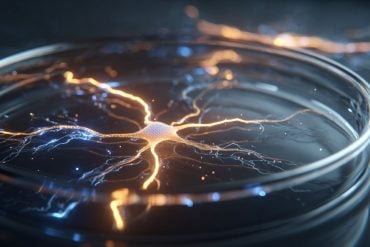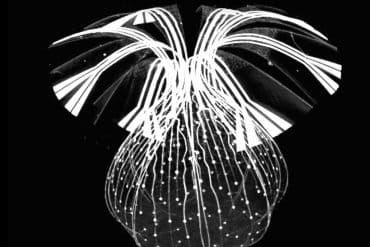Summary: The ability to foster and form secure interpersonal attachments can mitigate some of the genetic risks associated with PTSD.
Source: Yale
Researchers at Yale and elsewhere previously identified a host of genetic risk factors that help explain why some veterans are especially susceptible to the debilitating symptoms of post-traumatic stress disorder (PTSD).
A new Yale-led study published Oct. 1 in the journal Biological Psychiatry has now identified a social factor that can mitigate these genetic risks: the ability to form loving and trusting relationships with others.
The study is one of the first to explore the role of nurture as well as nature in its investigation of the biological basis of PTSD.
“We exist in a context. We are more than our genes,” said Yale’s Robert H. Pietrzak, associate professor of psychiatry and public health, and senior author of the study.
Pietrzak is also director of the Translational Psychiatric Epidemiology Laboratory of the Clinical Neurosciences Division of the U.S. Department of Veterans Affairs National Center for PTSD.
Like many genetic studies on mental disorders such as depression, anxiety, and schizophrenia, PTSD studies have revealed numerous genetic risk factors that contribute to the severity of the disorder. For instance, a previous study of more than 165,000 U.S. military veterans led by Yale’s Joel Gelernter, the Foundations Fund Professor of Psychiatry and professor of genetics and of neuroscience, found variants in eight separate regions of the genome that help predict who is most likely to experience the repeated disturbing memories and flashbacks that are hallmark symptoms of PTSD.
In the new study, Pietrzak, Gelernter, and colleagues looked at psychological as well as genetic data collected from the National Health and Resilience in Veterans Study, which surveyed a national sample of U.S. military veterans, and is supported by the National Center for PTSD. The researchers specifically focused on a measure of attachment style — the ability or inability to form meaningful relations with others — as a potential moderator of genetic risk for PTSD symptoms.
Individuals with a secure attachment style perceive relationships as stable, feel that they are worthy of love and trust, and are able to solicit help from others. Those with an insecure attachment style report an aversion to or anxiety about intimacy with others, and have difficulty asking for help from others.
They found that the ability to form secure attachments essentially neutralized the collective effects of genetic risk for PTSD symptoms. The impact was particularly pronounced in a variant of the IGSF11 gene, which has been linked to synaptic plasticity or the ability of the brain to form new connections between brain cells.

Pietrzak noted that deficits in synaptic plasticity have also been linked to PTSD, depression, and anxiety, among other mental disorders. The findings illustrate the importance of integrating environmental and social as well as genetic factors in the study of PTSD and related disorders, the authors said.
“Social environmental factors are critical to informing risk for PTSD and should be considered as potential moderators of genetic effects,” he said.
“The ability to form secure attachments is one of the strongest protective factors for PTSD.”
The findings, which will help predict who is at greater risk of experiencing severe symptoms of PTSD, also suggest that psychological treatments targeting interpersonal relationships may help mitigate PTSD symptoms in veterans with elevated genetic risk for this disorder, he said.
About this PTSD research news
Source: Yale
Contact: Bess Connolly – Yale
Image: The image is in the public domain
Original Research: “Attachment style moderates polygenic risk for posttraumatic stress in United States military veterans: Results from the National Health and Resilience in Veterans Study” by Robert H. Pietrzak et al. Biological Psychiatry.
Abstract
Attachment style moderates polygenic risk for posttraumatic stress in United States military veterans: Results from the National Health and Resilience in Veterans Study
Background
Polygenic risk scores (PRS) derived from genome-wide association studies (GWAS) of posttraumatic stress disorder (PTSD) may inform risk for this disorder. To date, however, no known study has examined whether social environmental factors such as attachment style may moderate the relation between PRS and PTSD.
Methods
We evaluated main and interactive effects of PRS and attachment style on PTSD symptoms in a nationally representative sample of trauma-exposed, European-American U.S. military veterans ( N=2,030). PRS were derived from a GWAS of PTSD re-experiencing symptoms ( N=146,660) in the Million Veteran Program cohort. Using one-sample Mendelian randomization (MR) with data from the UK Biobank (N=115,099), we evaluated the effects of re-experiencing PRS and attachment style on PTSD symptoms.
Results
Higher re-experiencing PRS and secure attachment style were independently associated with PTSD symptoms. A significant PRS-by-attachment-style interaction was also observed (β=-0.11, p=0.006) with a positive association between re-experiencing PRS and PTSD symptoms observed only among veterans with an insecure attachment style. One-sample MR analyses suggested that the association between PTSD symptoms and attachment style is bidirectional. PRS enrichment analyses revealed a significant interaction between attachment style and a variant mapping to the IGSF11 gene (rs151177743;p=2.1×10 -7), which is implicated in regulating excitatory synaptic transmission and plasticity.
Conclusions
Attachment style may moderate polygenic risk for PTSD symptoms, and a novel locus implicated in synaptic transmission and plasticity may serve as a possible biological mediator of this association. These findings may help inform interpersonally-oriented treatments for PTSD for individuals with high polygenic risk for this disorder.






